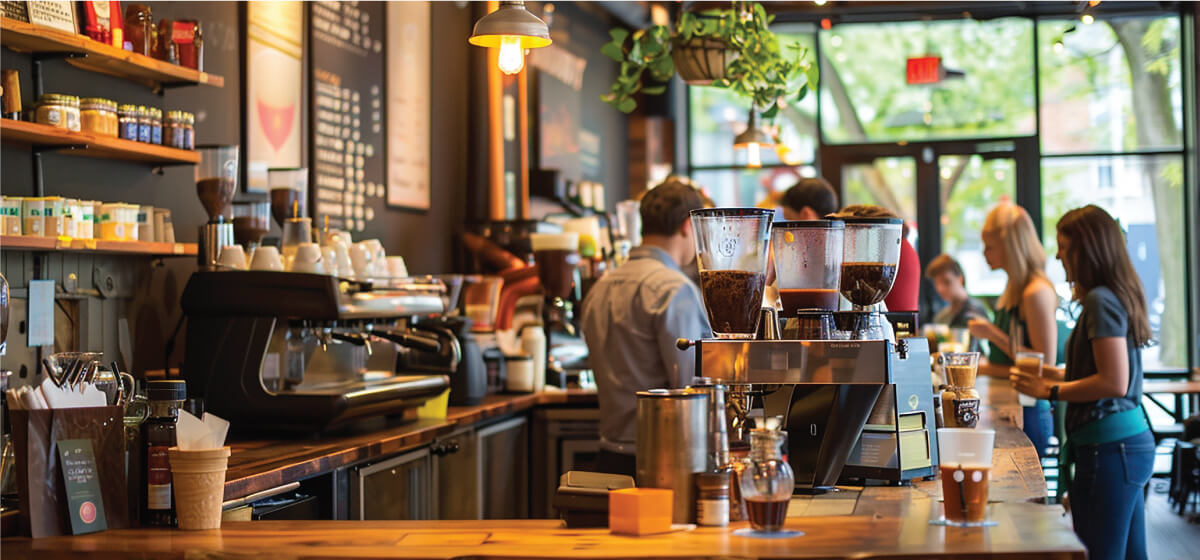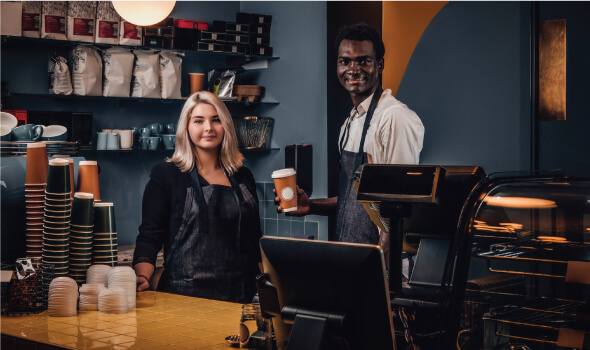Running a coffee shop might be your dream, but it shouldn’t be your dream at any price. Whether you’re buying a café or planning to sell one already, knowing how much your business is actually worth is crucial. After all, you don’t want to be overpaying or leaving money on the table.
Today’s coffee shops in the UK are worth an estimated £6.1 billion, hitting record highs year after year. It’s a great time to be in the café industry, but what so many entrepreneurs miss out on is the science of valuation.
Don’t fret about it or resort to guesstimates because this guide covers everything you need to know about how you can value a coffee shop.
The role of a business valuation for a café or coffee shop

The UK boasts a business population of 5.5 million small and medium-sized businesses, representing 99% of all businesses. Unless you’re a mega corporation, the chances are you haven’t thought about the art of mergers and acquisitions. Of course, buying a coffee outlet or selling a café are the two most important reasons why you might want a valuation, but there are others.
Here are just some of the other reasons why valuations are necessary beyond a straight sale:
- Seeking investment to expand your brand.
- Calculating for tax purposes, such as when you’re transferring ownership.
- Dealing with legal disputes, like partnership disputes or settling your estate.
- Strategic planning for making better decisions.
- Succession planning.
It’s considered a best practice to value your café or coffee shop every so often for any number of these reasons. In other words, you’re acting proactively, not reactively.
Try out our business valuation calculator today.
Contact Cogogo to Find the Right Cafe Business for You
What are the methods of valuation for coffee shops?
About a third of business owners in the small and medium-sized business sector don’t know what they’re worth, much less how to perform a valuation. Naturally, several methodologies come into play when valuing businesses. Each has its use in maximising value. It’s why appraisers will often use more than one to get an accurate number.
Let’s split this into three categories:
Income approach
The income approach concentrates on a café’s ability to generate future income. It factors in the cash flow that a coffee shop might produce, and several methods fall under this. The most common is the Discounted Cash Flow (DCF) method, which is used to project cash flows over the next three to five years. It then uses a discount rate to discount those projections to their present value.
On the other hand, you might also use capitalisation of earnings. This works best for cafes with stable incomes and involves using a figure like net profit and dividing it by a capitalisation rate. The final figure represents a reasonable rate of return for a potential buyer.
Our cafe business hub might provide you with some more helpful information around selling a cafe or coffee shop.
Market approach
The market approach essentially compares your coffee shop with comparable ones that have recently been sold. It involves an examination of similar businesses in your niche and area to get a rough idea of what you might be worth.
For example, you might perform a Comparable Company Analysis (CCA), which uses metrics like revenue multiples or price-to-earnings from recent transactions.
In most cases, the market approach is the more straightforward option if there are plenty of recent sales to look into.
Asset approach
The asset approach values your café based on its assets minus its liabilities. Although it sounds straightforward because you’re just valuing your assets and liabilities at fair market value, it doesn’t properly account for the intangibles, such as brand value and intellectual property.
Additionally, a central sticking point could be complications over defining fair market value for an asset.
Understanding the fair market value of a coffee shop
Fair Market Value (FMV) is a vital legal concept in business valuations. It assumes that both buyer and seller are acting knowledgeably and without undue pressure or coercion to buy or sell. It matters because it’s what HMRC uses to determine the taxable value of assets.
For example, purposely disposing of a café at below fair market value to a family member or associate to avoid tax could lead to an investigation. Note that fair doesn’t mean actual market value.
Maximising the value of a coffee shop
Whatever your motivations for valuing your coffee shop, you want your valuation to reach as high as possible. But what are the keys to a strong valuation? It shouldn’t surprise you to learn that revenue and profitability are the driving factors, but they’re not the only ones.
Some of the other areas to focus on to maximise a valuation include:
- Building a capable management team that isn’t reliant on the owner.
- Cleaning up your financial records.
- Streamlining your workflows.
- Strengthening branding/marketing.
- Create plans with growth potential.
- Diversifying your offerings.
As you can see, it isn’t just about your present situation but how well you’re positioned for future growth and your resilience to the comings and goings of the wider coffee shop market.
Browse All of Our Cafe Business for Sale Now
Other factors to consider when valuing a coffee shop

Most reports into coffee shops focus on the obvious of sales, profits and product margins, but there’s more to that when valuing an outlet. Here are some of the lesser-known factors to consider:
- Customer loyalty (dedicated loyalty programs)
- Brand value
- Reputation
- Employee culture
- Managerial performance
- Competition
- Location
It’s not just the figures on your balance sheet but the broader market and where you fit into it. These factors merely scratch the surface of what a professional valuation agent will factor into their reports. What it does prove is there’s so much beyond what most entrepreneurs might immediately think about.
Above all, it’s not just about where you are but where you’re likely to go in the future. That’s why it’s vital to have firm growth strategies in place, whether it’s diversifying your menu or expanding into a new UK market.
At Cogogo, we support café owners in buying and selling outlets nationwide to help make their growth plans a reality. To learn more, contact us today, or browse our range of coffee shops for sale today.

